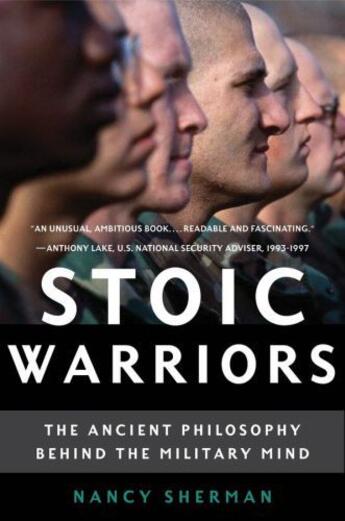Des idées de lecture pour ce début d'année !
Passionné(e) de lecture ? Inscrivez-vous
gratuitement ou connectez-vous pour rejoindre la
communauté et bénéficier de toutes les fonctionnalités du site !

While few soldiers may have read the works of Epictetus or Marcus Aurelius, it is undoubtedly true that the ancient philosophy known as Stoicism guides the actions of many in the military. Soldiers and seamen learn early in their training "to suck it up," to endure, to put aside their feelings and to get on with the mission.
Stoic Warriors is the first book to delve deeply into the ancient legacy of this relationship, exploring what the Stoic philosophy actually is, the role it plays in the character of the military (both ancient and modern), and its powerful value as a philosophy of life. Marshalling anecdotes from military history--ranging from ancient Greek wars to World War II, Vietnam, and Iraq--Nancy Sherman illuminates the military mind and uses it as a window on the virtues of the Stoic philosophy, which are far richer and more interesting than our popularized notions. Sherman--a respected philosopher who taught at the US Naval Academy--explores the deep, lasting value that Stoicism can yield, in issues of military leadership and character; in the Stoic conception of anger and its control (does a warrior need anger to go to battle?); and in Stoic thinking about fear and resilience, grief and mourning, and the value of camaraderie and brotherhood. Sherman concludes by recommending a moderate Stoicism, where the task for the individual, both civilian and military, youth and adult, is to temper control with forgiveness, and warrior drive and achievement with humility and humor.
Here then is a perceptive investigation of what makes Stoicism so compelling not only as a guiding principle for the military, but as a philosophy for anyone facing the hardships of life.
Il n'y a pas encore de discussion sur ce livre
Soyez le premier à en lancer une !

Des idées de lecture pour ce début d'année !

Si certaines sont impressionnantes et effrayantes, d'autres sont drôles et rassurantes !

A gagner : la BD jeunesse adaptée du classique de Mary Shelley !

Caraïbes, 1492. "Ce sont ceux qui ont posé le pied sur ces terres qui ont amené la barbarie, la torture, la cruauté, la destruction des lieux, la mort..."